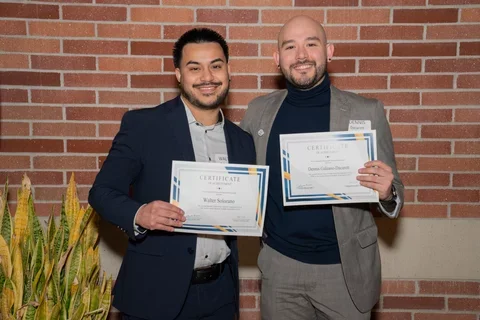Continuous Glucose Monitor policy changes could close equity gaps

UCLA Health resident aims to serve under-resourced patients
Current estimates from the Centers for Disease Control and Prevention (CDC) show that 1 in 3 Americans will develop diabetes sometime in their lifetime. Additionally, diabetes is more common among American Indian or Alaska Native, non-Hispanic Black, Hispanic and Asian people, than non-Hispanic white people.
According to a study from the CDC, income-related inequalities in diabetes have also greatly widened over the last decade.
Walter Solorzano, MD, MPH, a second-year Internal Medicine resident, was recently awarded an Innovation Grant by the Office of Health Equity, Diversity and Inclusion, to conduct research assessing the barriers of Continuous Glucose Monitors (CGM) among vulnerable populations with diabetes. The grants, though supported by HEDI, were the brainchild of the Minority Housestaff Organization (MHO), to which Dr. Solorzano is a member. MHO recruits, develops and advances physicians from historically under-represented racial and ethnic groups in medicine and is dedicated to advocating for under-represented communities.
CGMs allow people with diabetes to monitor their blood sugar levels in real-time to achieve better health outcomes.
Dr. Solorzano met with Estelle Everett, MD, an endocrinologist and Health Services Researcher at the David Geffen School of Medicine, during a rotation at the West Los Angeles VA Medical Center Endocrinology Clinic. They shared their interest in health disparities work and discussed the possibility of working together on a project with the Diabetes Medical Program (DMP), at the Simms/Mann Health and Wellness Center, at the Venice Family Clinic.
“We met with DMP leadership at Simms/Mann and they let us know that they were in the process of rolling out more Continuous Glucose Monitors (CGMs) for patients with diabetes, so we developed a project that would be timely and relevant for the clinic,” he says.
On Jan. 1, 2022, a California Medi-Cal policy change resulted in CGM systems becoming more readily available to lower-income recipients, as an effort to address diabetes-related disparities.
Dr. Everett, the principal investigator (PI) for the study, has been guiding Dr. Solorzano through the implementation of the project.
“I think there may be many reasons to barriers for use other than insurance barriers, for example, provider biases on whom they recommend technology, patients being unaware the availability of these devices, or reluctancy to try something new, etc. Our goal is to figure out what that is and how we can support patients to make sure they are using it effectively,” says Dr. Everett.
Though the project is in its early phases and still seeking Institutional Review Board (IRB) approval, Dr. Solorzano says the project will analyze how low-income, under-resourced, and publicly insured patients with diabetes are interacting with CGMs.
“For example, we would like to know if it is improving diabetes control, some of the barriers to use and if it’s led to any changes in behavior, such as improved diet and exercise” he says. “One of my career goals is to give a voice to those that are often ignored in our society. That is why we are doing qualitative research with surveys and making use of patient experience in our project.”
In addition to working with Dr. Everett, Dr. Solorzano recruited two medical students from the UCLA chapter of the Latino Medical Student Association (LMSA), Kathyana Santiago and Joseph Borrell, to provide mentorship and opportunities for other students from under-represented backgrounds in medicine.
Dr. Solorzano self-identifies as a proud Salvadoran-American, from the Southeast Los Angeles County area. Throughout his life he witnessed the ways health inequities lead to poor health outcomes for people who are low-income, uninsured, underinsured and from immigrant backgrounds.
He says his motivation for wanting to become a doctor was to be part of the necessary change in medicine, bringing evidence-based, quality care and advocacy to patients in need.
After residency, Dr. Solorzano plans to practice as a primary care physician in the Los Angeles area, primarily serving under-resourced communities.
Original Article: "Continuous Glucose Monitor policy changes could close equity gaps"



